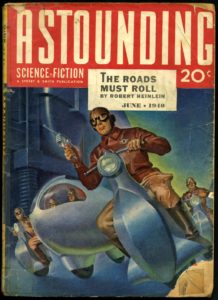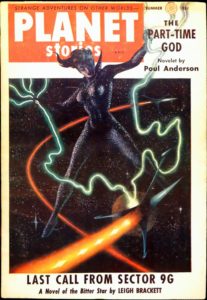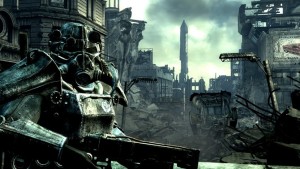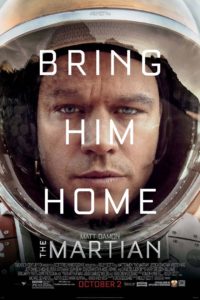Looking Forward: Optimistic Speculation Wanted
Posted by Rampant Coyote on September 30, 2016
 I think I’ve noted my somewhat recent delves into reading pulp fiction from the early-to-mid 20th century. I can’t say I’m reading it extremely broadly… it’s a huge area, and I have my favorite authors. Like every field, Sturgeon’s Law applies: 90% of everything is crap. Theodore Sturgeon oughta know. He was a pulp writer, too.
I think I’ve noted my somewhat recent delves into reading pulp fiction from the early-to-mid 20th century. I can’t say I’m reading it extremely broadly… it’s a huge area, and I have my favorite authors. Like every field, Sturgeon’s Law applies: 90% of everything is crap. Theodore Sturgeon oughta know. He was a pulp writer, too.
One thing I have learned is that the preconceptions of the “style” of the science fiction of the pulp era are way off-base. Most of the time, they are based not on the stories themselves, but on just the covers of the magazines. And… okay, the magazine covers were pretty wild. Or early SF movies. Or the movie posters from early SF movies. There’s this view that Science Fiction was this vapid genre of rocket ships, lantern-jawed heroes, bug-eyed monsters, and damsels in distress. Yes, you get that. And yes, they are often lurid and action-oriented. Pulp’s heyday was in the era before Television became common… and certainly before video games. It filled that niche.
 But stylistically, the stories ran the gamut. At least the better stuff did. Even in Fish Men of Venus, it wasn’t the Fish Men who were the true bad guys, but a close human friend and ally who proved to be a betrayer. The future isn’t always optimistic. The heroes may have issues. The villains have issues. A gun of some kind or at least a balled-up fist might be required before the end of the story, but they usually aren’t the solution to anything but a temporary problem. The heroes weren’t always heroic… sometimes they were just trying to redeem themselves. The better SF of the era might feel a little quaint on the technology side, but still packs a punch, still asks interesting questions, and still holds up a mirror to our society today.
But stylistically, the stories ran the gamut. At least the better stuff did. Even in Fish Men of Venus, it wasn’t the Fish Men who were the true bad guys, but a close human friend and ally who proved to be a betrayer. The future isn’t always optimistic. The heroes may have issues. The villains have issues. A gun of some kind or at least a balled-up fist might be required before the end of the story, but they usually aren’t the solution to anything but a temporary problem. The heroes weren’t always heroic… sometimes they were just trying to redeem themselves. The better SF of the era might feel a little quaint on the technology side, but still packs a punch, still asks interesting questions, and still holds up a mirror to our society today.
Most stories could be considered optimistic. The worlds aren’t overly oppressive or dark. The hero wins in the end… depending upon what he was struggling for. Maybe (usually) not the goal he was struggling for, but in the end, he (or, admittedly less frequently, she) pulls off a victory. We get a reasonably happy ending. Exceptions abounded. But people weren’t buying this stuff to get depressed about the future. They were buying it and reading it for escape, adventure, and inspiration, with a bit of nuance and a chance to think about some really unusual questions.
Years later, the stereotype stuck.
There’s been a trend over the last 25 years to go darker, grittier, and to push back against a stereotype of older science fiction. I first became aware of it with Cyberpunk, but it didn’t start there. In an article in Time, Graeme McMillan believes the trend may be closer to 40 years:
Such pessimism and fascination with future dystopias really took hold of mainstream sci-fi in the 1970s and ’80s, as pop culture found itself struggling with general disillusionment as a whole. Certainly, at the time, there was much to be disillusioned about; the optimism and hope of the late ’60s fell apart as the hippie dream of a new Age of Aquarius came face to face with a reality filled with an unpopular war, civil rights riots and all-new reasons to feel suspicious of and disappointed in those in authority, so it’s hardly any surprise that the future became a darker, less inviting place.
Now, I do enjoy dystopian, post-apocalyptic, darker, grittier stuff. I love Cyberpunk. I like some stories that serve as much of a warning as to what we might become as those with a more optimistic view of the future. Variety is the spice of life. But, like McMillan says, it can get to the point where it feels stuck in a rut.
 Since I have much more experience in video games, I have to agree that it’s pretty prevalent in gaming, too. Maybe artists prefer building nasty, gritty, dirty environments more than the clean and brightly-lit ones? Or is that just the designers? Whatever the case, the future is certainly grim, dark, and gritty in many video games, and it seems like that’s true in the biggest games. But is there a causal relationship there, and which way does it go?
Since I have much more experience in video games, I have to agree that it’s pretty prevalent in gaming, too. Maybe artists prefer building nasty, gritty, dirty environments more than the clean and brightly-lit ones? Or is that just the designers? Whatever the case, the future is certainly grim, dark, and gritty in many video games, and it seems like that’s true in the biggest games. But is there a causal relationship there, and which way does it go?
It’s not that the darker worlds are more exciting or dangerous. They are not. Optimistic worlds are rarely a paradise, and can be as full of peril and conflict as any other. Fans of Star Wars or The Martian know better. For that matter, after The Martian (book and movie), audiences now know that “hard” science fiction can be every bit as fun and exciting as the more fanciful stuff. Not to mention popular.
 If I had to pick a preference (and why would someone force me to do that? Why? Why?), I would probably choose the stuff that inspires. We need that. It’s important to look up, to catch a vision of potential, and to work towards something, and not just away from something. Something hopeful, not just something that’s disturbingly believable. It can be harder to write… to imagine solutions and not just problems. Because then, as with all art, that can fire the imagination and encourage others to imagine solutions as well.
If I had to pick a preference (and why would someone force me to do that? Why? Why?), I would probably choose the stuff that inspires. We need that. It’s important to look up, to catch a vision of potential, and to work towards something, and not just away from something. Something hopeful, not just something that’s disturbingly believable. It can be harder to write… to imagine solutions and not just problems. Because then, as with all art, that can fire the imagination and encourage others to imagine solutions as well.
In fact, there’s an argument that without the arts doing exactly that in the 20th century, we never would have made the progress we did in the space program, landing men on the moon and sending probes to the other planets in the Solar system. AtlasObscura has an article about how the arts influenced space exploration – particularly artists impressions of other worlds and potential space missions – may have made a huge difference not just in the public, but also inspired scientists and helped unlock new ideas. (Again, I wonder how much of a boost The Martian has been for promoting Mars projects).
Andrew Liptak on Flipboard also talks about the push to get back to optimistic science fiction in television. I didn’t think TV was struggling too hard with a lack of optimistic science fiction shows… but I’m not quite up to speed on TV these days, and while speculative fiction has really grown in TV in the last decade, admittedly a lot of it is paranormal, fantasy, superhero, etc.
Some authors have pushed to restore a bit more optimism to science fiction, as well. From Neil Stephenson (best known for his wild, fun Cyberpunk novel, Snow Crash) to lesser-known authors, many have made calls to put the optimism, hope, and inspiration back into science fiction. Not that it ever entirely left. Not by a long shot. But I think these calls were as much to call attention to what’s already being done as to help generate more, in an effort to balance the scales somewhat.
And so I guess I’m adding to the call. Not that I dislike the other stuff. I simply want more variety. I just want to see more games, books, and movies that tackle the optimistic side of science fiction. I want stuff that inspires me.
Filed Under: Books, Mainstream Games, Movies, Short Fiction - Comments: 3 Comments to Read
Luke Hughes said,
So when are you going to do a Pulp RPG for us?
Luke
p.s. agree with your sentiment.
Rampant Coyote said,
Been pondering that a bit myself, actually. No big surprise there. But Frayed Knights still has priority.
Oscar said,
read any of Lin Carters Thongor books, they’re petty damn funny.